Galactic Civilizations II Review
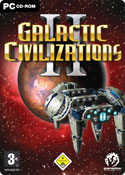
| Developer: | Stardock |
| Publisher: | Stardock / Paradox (Europe) |
| Genre: | Turn Based Strategy |
| Platform: | PC |
| Official Site: | |
| Release Date: | March 3, 2006 (UK) |
| Reviewer: | James Barlow (Malis) |
| Buy now at Amazon.co.uk | |
Galactic Civilizations II is very much from the same mould as the Civilization games of old (and indeed - new): a turn-based strategy that empowers the player with ludicrous amounts of micro-management. Games are won and lost through mastery of politics, diplomacy, research, economics, and of course, military strength. Fly-boys and joystick jockeys you may want to stop reading now. Those of you who get a warm glow from solving a planets overpopulation problem by sending people off to colonise new star systems, whilst simultaneously balancing the books on your home-world, please read on.
The game itself offers several modes of play, and being the genre-rookie I am, jumped straight into the campaign. The story itself is fairly uninspiring, revolving around the humans and their battle with the evil Drengin. However you soon discover a greater evil is lurking in space�and so forth, I won't give away any more, but I'm sure you get the idea. The missions are fairly inventive and fun, often requiring you to win over a potential ally through cunning diplomacy and pitting you against anything the Drengin can throw at you. As the game progresses more technologies will be unlocked, allowing you to progress from firing bullets to plasma and so forth. However: I found there to be a big problem with the campaign setting: Every mission you start again from scratch, meaning that you have to rebuild your fleet and indeed, even research all technologies again. Bear in mind that some end-tier techs can take upwards of 70 game weeks to research if you only have a few planets! To me this kills the flow of the story and indeed, is a bit frustrating too. So, having seen what I wanted of the campaign spent the rest of my time poking around in the sandbox universe mode.
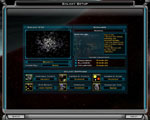
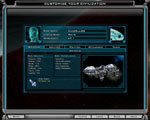

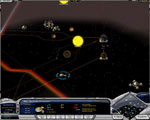
Sandbox mode offers a far more compelling game, as you tailor the size of your universe precisely to your needs. Sizes of universe ranges from tiny to gigantic, and you can determine how many habitable planets you are likely to find. Bear in mind that small maps can last a whole day. The biggest galaxies are the sort of games you will be playing for weeks, tinkering your empire until you finally achieve victory.
I'll take a brief moment here to mention the graphics. While they aren't mind-blowing or awe-inspiring, they do, in short, get the job done. Ships that resemble monopoly pieces from afar become full scale cruisers with a flick of a mouse-wheel. Ship models are a blocky, but this can be forgiven due to the lego nature of construction. Truly, if you enjoy the game you'll be too absorbed by the game-play to notice any graphical shortcomings. The game is fully 3D allowing for as much zooming and panning around your fleets and planets as you desire. A very competent camera and easy interface only serve to make the game feel slicker. Presentation wise, the game is faultless; buttons are clear and well-labeled, with tool tips making the game a breeze to navigate.
The game mechanics of GalCiv II are every bit as user-friendly as the interface. Expecting a barrage of in-depth stats and figures I was surprised at how simple it was to grasp. Researching techs all require a certain amount of game weeks ( i.e. game turns) to research. Want to increase the research rate? Just build some research centers on a planet and watch the weeks slide off. Research can be stopped, started and switched at any time: if you spend 5weeks researching tech A and switch to tech B, the game will pick up where you left off on tech A when you return to it. Want to set taxes, but don't know how this will affect your popularity with the people? No problem, GalCiv II uses a 'real-time' slider of sorts - simply slide the tax rate up and you will see your approval drop in real-time, and your net income go up. Slide it down and watch you're the reverse happen. It's features like these that really started to impress me, as it meant less time fiddling around, and more time building ships.
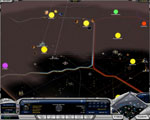
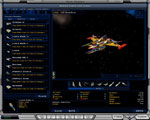
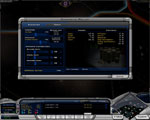
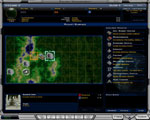
Ah, ship-building: possibly GalCiv II's single greatest game-play feature. Hours of my game time were spent just tinkering around in the shipyard. Whilst the game offers you a certain amount of ship types and designs, most of us will want to build our own Millenium Falcons from the ground up. Ship construction is very easy, and like the rest of the game, is handled in a no-nonsense, sensible fashion. All ships are built out of hulls. Each hull type (tiny, small, medium�you get the idea) comes with a certain amount of points. These tell the user how many weapons, utilities and shielding can be installed. Weapons and ship mods all have a certain point value, and when attached to a hull use up that amount of the hulls total point value. Research into better weapons, life-support and such reduce the amount of points each mod uses, allowing for more geared ships as research improves. Bigger and better hulls themselves can also be researched. Actual construction is handled in a Lego fashion, with weapons and such being dragged onto red 'contact' points on the hull in the shipyard screen, whereby they snap into place. Add in a wealth of non-point related mods and extras (wings, lights and other wonders) to customize just how your ship looks, and you have a very complete and powerful tool, not to mention fun.
But why bother fiddling with new ship types? Well in short, the AI is impressive. So impressive on higher levels that if you don't adapt with your ship designs, the AI certainly will - and decimate you. It's all very well having ships with the greatest laser shields in the galaxy if they have no defence against the pitiful tier 1 missiles the computer has researched. Combat is handled using 3 classes of attack, laser, cannons and missiles, with each discipline having its own counter-measure. Battles are simple affairs that are easy to predict if you know the game mechanics. However Stardock has tried to liven them up with Combat Viewer mode, which shows the fights in a film-like mode, allowing you to zoom in and even the pause the action, or replay it over and over.
The manual claims that on higher levels the AI can analyze common human tactics, and it certainly feels like it. In one memorable game I had control of a large portion of the galaxy and frankly, got complacent. Out of nowhere the race that I was most at peace with (and who had done the most research out of any of us) suddenly allied with my prime enemy, a warlike insect race. In the chaos that ensued, the first race shared all of its research with the Insectoids, who promptly developed ships of far too greater power for me to defend against. The peaceful race had analyzed both the races and predicted who would offer them the most protection out of an alliance. Hmm, definitely sneaky. But this crushing defeat taught me the importance of the final key area of GalCiv II, diplomacy.
While at first I shied away from diplomatic relations and research (why research Embassies when you can research Planetary Bombardment?!), I soon learnt its value. Opening a comms channel with another race leader allows for trade and negotiations to begin. Whilst ships, money and even planets can be traded, the most important feature is the ability to trade research with other races. So many times I was researching some long-term development (making jungles habitable takes a long time), and I suddenly would want another technology for ship building. So, I would just be a nice diplomatic guy and see if any nations could trade me what I wanted. Shrewd use of diplomacy can net you a lot of free research - just be careful you don't give away military secrets to races likely to use them against you!

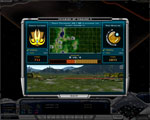

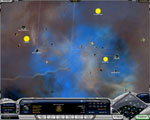
Summary
Of course, no game is perfect and there are some annoyances with GalCiv II. At times the AI can seem too, erm� peaceful. In a few games I found myself just chain researching and constructing star bases, with the computer quite happy to do the same. Of course I could have initiated war, but it would be nice to see a bit more drama every now and then. In these dry periods of activity, it becomes all to easy and tempting to just click the turn button 50 times, so that 50 week research you want is available in 20seconds.
I feel the research times could be tweaked and balanced a bit more to offer deeper game-play. It often feels that (with appropriate amount of planetary research centers) research is too quick and easy. This places little value on low tier techs, as you can just race through the ranks to the really devastating stuff, meaning you often feel as though you can't build a ship design, as a better one will be available in a few turns.
Finally, there is no multi-player. While this didn't really worry me greatly - I like to enjoy this game at my own pace, it might be a turn-off for many hardcore strategy fans. The game offers something called Metaverse, but as far as I can tell this is simply an online high score table, offering little in the way of motivational competition.
As you can probably tell, I really could go on all day about this game as it rewards so much the more you play. What strikes me is how deep and complex it is, while still retaining a very user-friendly approach and play style. I started expecting nothing but was rewarded with a complete and well-crafted game, clearly Stardock has put a lot love and effort into this. With good site support and the developers listening to feedback from gamers for content patches, the future looks stellar (sorry) for this series of games. In short, fun, polished and able to be enjoyed on any level. This is certainly my personal benchmark for the genre at the moment.
8.5 / 10
Good stuff
- Hours and hours of absorbing game time
- Sublime ship editor
- Simple yet clever economy management
- Good AI
- Lovingly crafted and polished
- Not a system hog
Not so good stuff
- No multi-player
- Campaign let down by frustrating mechanics
- Research times seems to need a bit more balancing
- Graphical style fairly plain
Girls Are You Packing For College? Then You Need To Read These Tips First.
Things You Should Buy Just After You Move Into New House
Packers and Movers Chennai Are the Best At Such An Affordable Price
Guide For Packing Up The Master Bedroom In An Organized Way